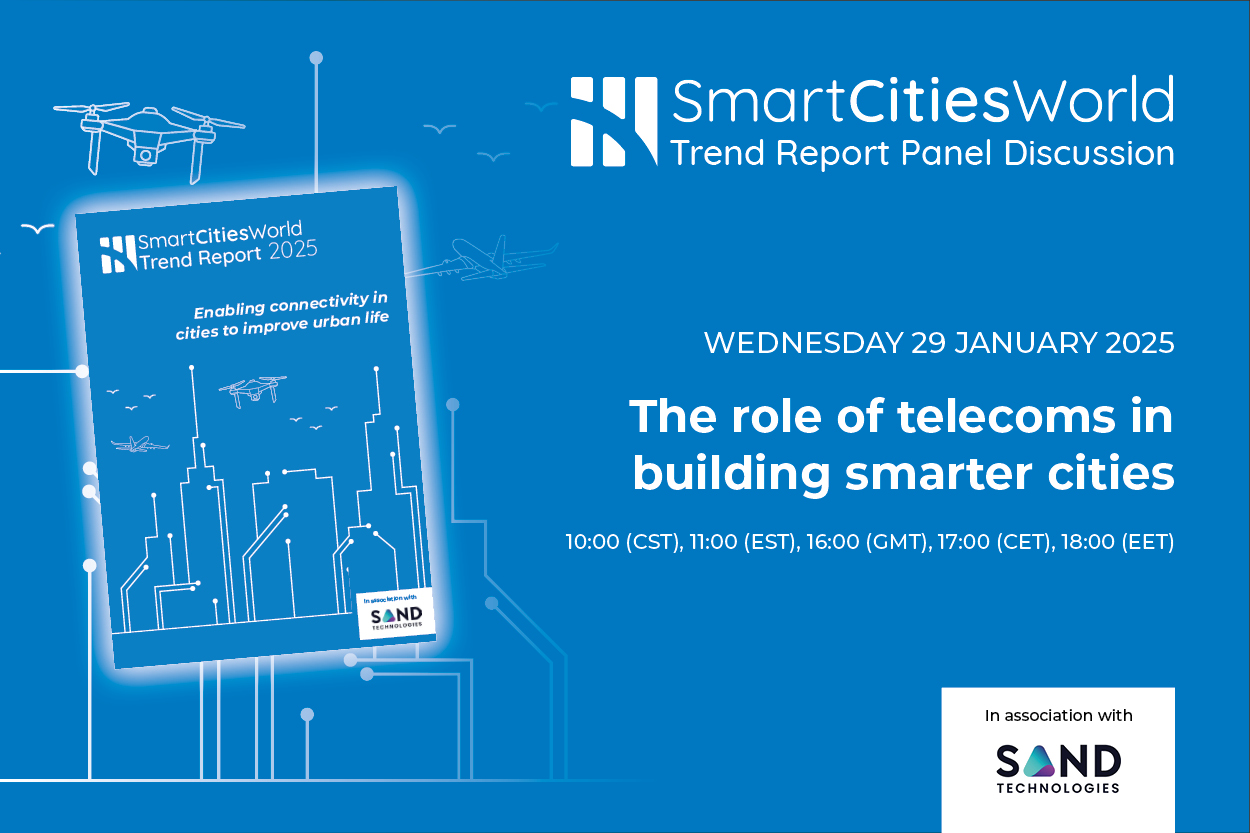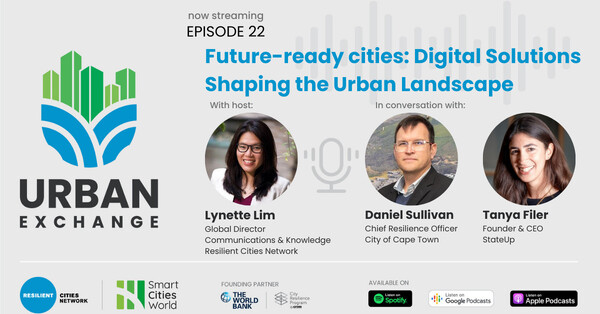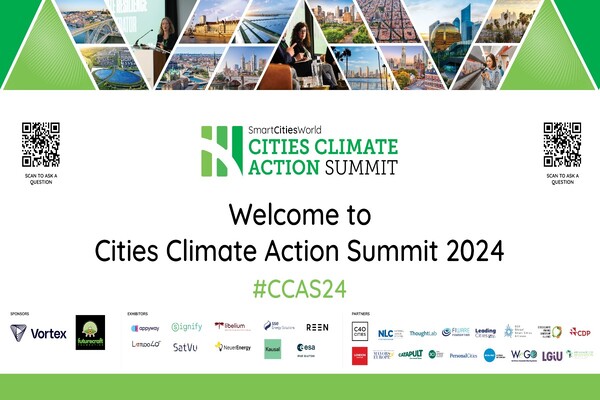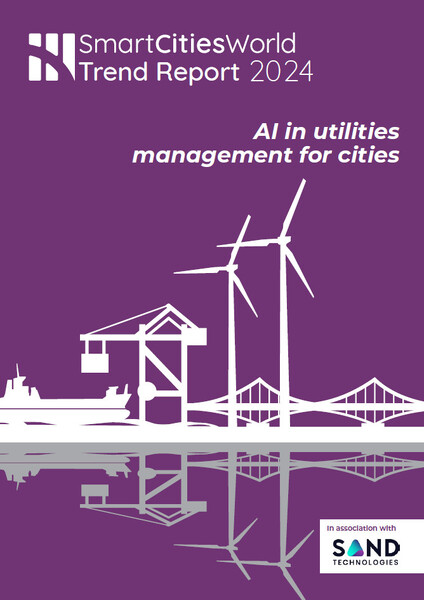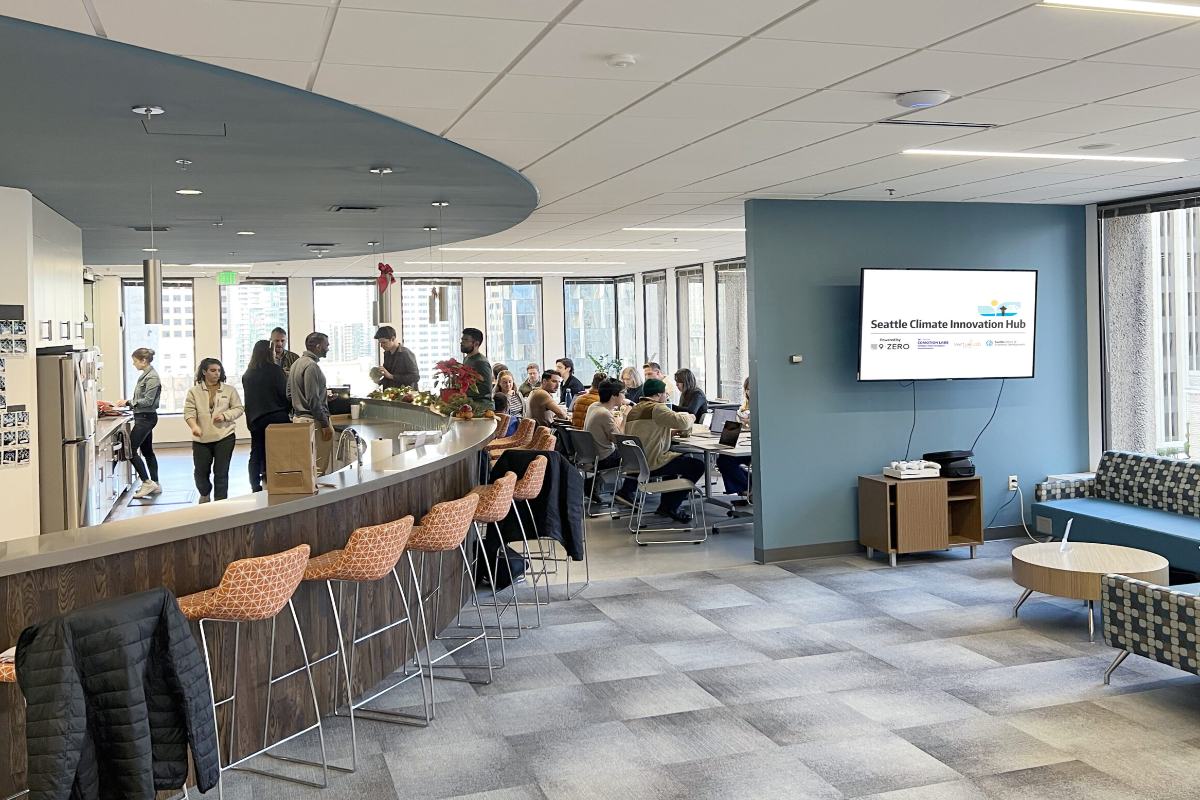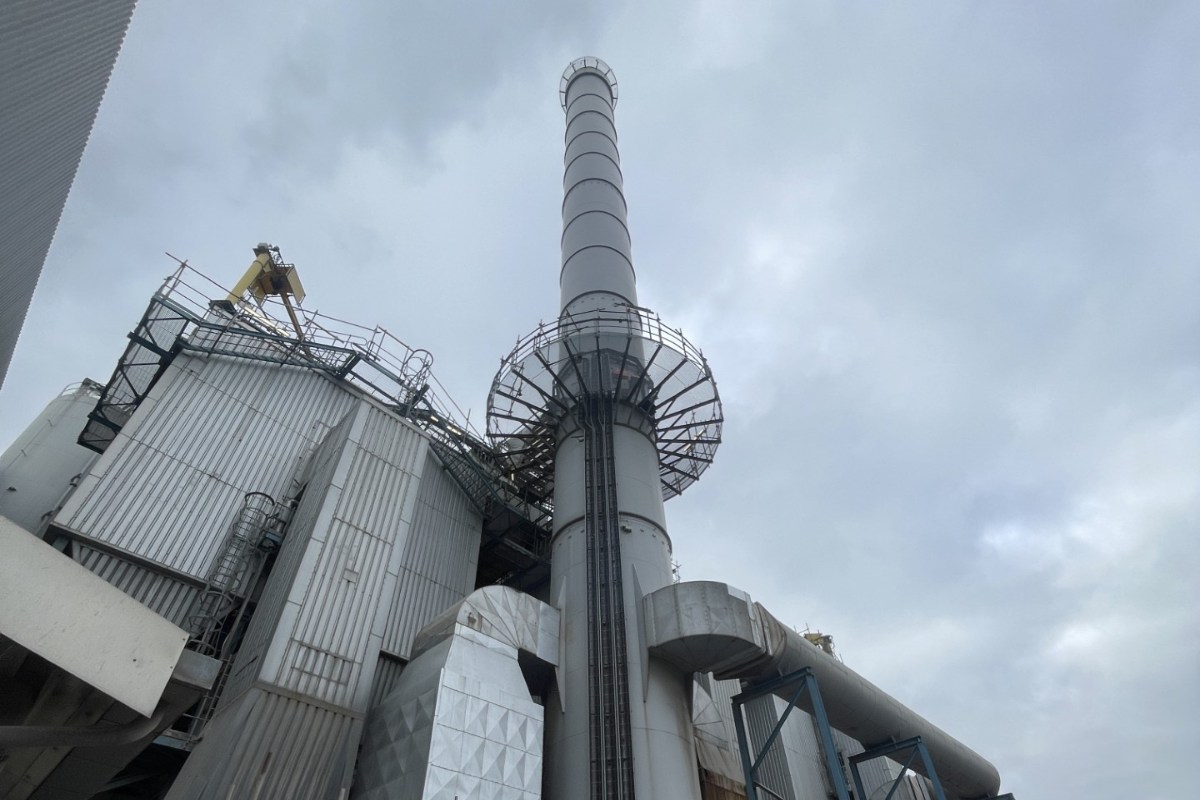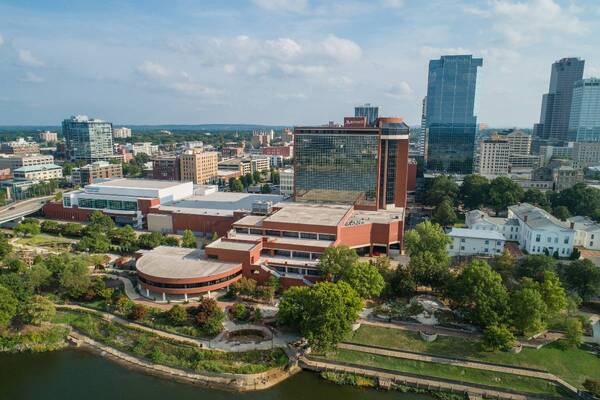Special Reports
SusHi Tech Tokyo 2024: experience ‘Tokyo 2050’ todaySponsored by The SusHi Tech Tokyo 2024 Showcase Program Executive Committee
Cities Climate Action Summit 2024 live blog
Follow all the action from the first day of SmartCitiesWorld’s Cities Climate Action Summit online today from 9.25am BST. There’s still time to register for the event and take part in the discussion
Many thanks to everyone who joined us today for day one of the Cities Climate Action Summit 2024. We look forward to seeing many of you at the in-person event in London tomorrow. Meantime, remember, you can access all of today’s content in your own time, on-demand by registering here.
There is a consensus among the mayors that the battle against climate change can’t be won alone and all welcome the sharing of best pracitice and "copying from each other".They are similarly united on the drive towards environmental justice. Jeni explains how the city is moving towards building performance standards and discusses a number of funding methods. Patricia talks about an idea inspired by Seattle to expand EV ownership and the city is also putting a local, innovative carbon offset programme in place which is a "ton for ton", verfifiable carbon credit scheme.
The mayors discuss their climate priorities. Justin, Mayor of Cleveland, explains that the city has a history of climate issues, citing the fire on the Cuyahoga river in 1969. Justin explains the city is committed to investing in green jobs and it has a raft of green initiatives in place, including a free citizen solar panel. Meanwhile, Fort Collins’ Mayor Jeni Arndt highlights some of the extreme weather hazards to have hit the city and says it did its first climate action plan in 1999. She referenced programmes like a 100 per cent electrification goals for City power by 2030 but stresses: "I don’t want to leave anyone behind." Cambridge City Councillor Patricia Nolan highlights that 80 per cent of her City’s emissions are from building operations so a priority is to reduce these. "We tried the carrot but we need a mindset change, we need the stick. We need mandates."
We have arrived at our final session and it promises to provide a fitting finale for such an action-packed day one of SmartCitiesWorld’s Cities Climate Action Summit. Sandra Baer is moderating the discussion with Jeni Arndt, Mayor, Fort Collins; Patricia Nolan, City Councillor, City of Cambridge; and Justin Bibb, Mayor, City of Cleveland, Ohio.
Remember, you can access all of today’s content in your own time, on-demand by registering here.
Work with the City of Amsterdam showed how big the carbon savings could be and what impact it would have on the city’s carbon footprint. Stockholm and Zurich are among the cities mentioned as active in carbon removal but few have formal carbon dioxide removal (CDR) plans in place. The forthcoming research report aims to show how cities can advance CDR plans. Christiaan says cities need to understand the different pathways for engagement and how CDR can be leveraged to achieve a range of city goals. "They should see CDR not as an additional burden but rather as an impact multiplier."
Most cities aren’t yet thining about carbon removal but it will become a critical piece of the climate action puzzle. Nikki explains that carbon removal is many things but at its core it involves removing carbon dioxide from air and ocean. She talks about emerging methods such as air capture, growing algae and carbon mineralisation and in future there will be a ’menu’ of options for cities. The innovation landscape for carbon removal is ’burgeoning’ says Chrsitiaan.
Now we have a fireside chat focused on carbon removal. We’d like to welcome Nikki Batchelor, Executive Director of XPRIZE Carbon Removal, who is in conversation with Christiaan Gevers Deynoot, South Pole, City CDR Lead. They will delve into the challenges and opportunities for cities in advancing carbon removal in synergy with other city priorities. They will be sharing insights from a soon to be published report by South Pole, XPRIZE and the Global Carbon Removal Partnership.
Carl says we need to add ’P’ for people and highlights the importance of looking in the long-term so ’projects’ survive and PPPs are vital in this. Mark said Tallinn is taking a ’contractual’ approach with the partner required to fulfil their contractual obligations and then the hope is a small project can scale-up. But he also acknowledges that it is possible an innovation project might be two years ahead of its time. Catalytic funding was also cited as having a role in helping to scale-up projects.
Panellists were asked how citizens feel about their area becoming a testbed. Johan says part of being a community relies on selflessness but you can also unite people against the common enemy of global warming. Carl explains Stockholm started by searching who could be the owners of a problem or solution, and cited one example where tenant-owners were identified as they all wanted to lower energy for their tenants -- they succeeded in doing this by 50 per cent. He explains they are exploring the possibility of developing a ’climate contract’ for citizens as its next pilot project. The discussion moves to the importance of transparency and consultancy and making citizens part of the success story.
The panellists discuss some of the challenges of running living labs in cities. Test in Tallinn has been a notable success for the city and Mark said the most critical challenge to address is time. City officials are extremely busy so they try to involve them at a creative level. Carl concurs with the time issue and Johan says with multiple stakeholders, the need to ensure there is an owner of an outcome is really important. Nalin cites cities being risk averse and also startups speaking a very different language as among the challenges.
Another panel discussion coming up now: Striking effective PPPs for environmental living labs and rollouts, designed to bring together key stakeholders, including city government representatives and industry leaders to delve into the benefits, challenges, and best practices of PPPs in establishing living labs and scaling up impactful environmental initiatives. On our panel are: Nalin Agarwal, founding partner,
Climate Collective; Carl Piva, Chairman, Stockholm Green Innovation District, Mark-Emil Talivere, Innovation Expert, City of Tallinn and Johan Hanekom, Principal for Sustainability and Innovation, Amazon Web Services.
One of the panellists raised concerns over private data, such as high-quality weather data, being available to wealthier citizens but this would bring inequity in itself. They also warned about only basing decisions on the data you have as opposed to the data " you don’t have".
There’s clearly a concensus among the panellists that cities need to get to the ’ground truth’ on data. Galen says we can use the data that we have on maps but what’s important is to also have a discussion on the ground with the community. "Inequity is a constant moving target," he says. "And in Miami we have a lot of displacement and gentrification, so we must get down on the ground." He explains how they have worked with consultants on small areas so they can get out and talk to people and be transparent about the data.
Marc explains how City of Austin wanted to create resilience hubs so got together with community voices, including hospitals, activitists and community groups to identify the best spots for them. They helped the city to ’ground-truth’ the data.
Dallas is similarly taking a very consultative approach -- its Forward Dallas programme is all about meeting with residents to figure out what their environmental concerns are. Carlos explains if we don’t ground-truth the data policies might not match the concerns of citizens.
Next up is another panel discussion: From air pollution to urban heat islands – using data to identify and correct climate inequities in communities. We welcome our spoeakers: Carlos Evans, Director, Office of Environmental Quality & Sustainability, City of Dallas, Galen Treuer, Climate Tech and Economic Innovation Manager, Miami-Dade County; and Marc Coudert, Climate Resilience & Adaptation Manager, City of Austin.
Acknowledging the disproportionate impact of climate change on marginalised communities, and the effect that digital technologies can have in addressing these types of challenges in other areas of urban life, this session is dedicated to how cities can harness data to pinpoint climate inequities and create tailored strategies for equitable climate resilience.
Remember, you can also comment and follow the discussion on #CCAS24.
To find out more about Braga’s drive to be a green and smart city and access all of today’s content, register here. It will also enable you to see Sandra Baer’s fascinating interview with Paula DiPerna, author of Pricing the Priceless. Paula is a pioneer of strategic global environmental and philanthropic policy. She serves as a Special Advisory to CDP, on the Board of Advisors of Global Kids, whose mission is to develop global citizenship; the Circle of Advisors of Rachel’s Network, which links women philanthropists who have environmental interests; and the Board of Directors of The HistoryMakers, a unique oral and video archive of profiles of African-American leaders in all sectors.
As a leader in the development of carbon markets, Paula served formerly as President of the international division of the Chicago Climate Exchange (CCX), the world’s first cap-and-trade system covering all six greenhouse gases, which also launched the Tianjin Climate Exchange (TCX), China’s first pilot carbon market. She also served formerly as President of the Joyce Foundation, a major US philanthropy, and as a writer, co-producer and Vice President for International Affairs for the Cousteau Society, whose principal was oceans pioneer Jacques-Yves Cousteau, with whose expeditions she travelled around the world.
In a fireside chat with SmartCitiesWorld brand ambassador Sandra Baer, entitled, Accounting for nature as a public asset, she explores the difference it could make to cities and urban environments to account for nature and green space as an asset in the same way as other infrastructure.
From the start, climate change and sustainability were a priority for Mayor Rio who took up the role in 2013. He has been instrumental in transforming Braga into a smart city. Braga is recognised as a green city. He talks about the importance of engaging with networks around the world and the City is an active member of many of these networks. When it comes to climate action, one of the major sources of concern in the city is mobility, responsible for 60 per cent of emissions. High car usage is also an issue. It is investing heavily in electric buses.
Mayor Rio also talks about the importance of citizen engagement. The City takes a highly inclusive approach and doesn’t just rely on those who are motivated or engaged but uses focus and community groups to take everyone along with its inititives. It also undertakes a survey every year and has an Engagement Matrix, which presents the relationship between priorities and actions.
The city has also developed a number of urban farms, which brings generations together, and a range of inclusive mobility initiatives. Given the long-term implications of climate change, an intergenerational approach underpins many of its initiatives.
It’s time for our final keynote of the day from the Mayor of Braga City Council, Ricardo Rio. Ricardo Bruno Antunes Machado Rio’s professional background includes roles as the General Secretary of the Portuguese Association of Financial Analysts and Director of the Capital Markets Institute of Euronext Lisbon, as well as serving as a university professor at several institutions. He transitioned into public service in 2001 and became the mayor of Braga in 2013, where he has been instrumental in transforming Braga into a smart city, and is now serving his third term. Beginning in August 2023, Rio assumed the role of Chair of the Executive Committee of the Global Parliament of Mayors, an organisation he joined in 2018 and has been a part of the Daily Board since 2019.
The discussion turns to citizen engagement with Aissata underscoring the importance of educating the public about why such work matters. The City works with young people to tell them why climate action is important and also suports the private sector to take bold leadership, for example, in retroffiting buildings. When it comes to leveraging data from sensor networks, she says it is important the climate action plans are addressing the nuanced needs of citizens. Other initiatives include the conversion of the Brooklyn Army Terminal to a climate tech hub which is key to NYC’s future plans. She also highlights the key part played by the City’s open data platform. But she says it is not just about capturing data but also taking intentional steps with it on a continuous basis.
James talks abut the resource challenge to deploying sensors and data capture. A lot of programmes have been in place for some years and they are based on broad principles but now they are becoming more targeted which leads to better allocation of resources.
Mike begins by asking the panellists how sensors can facilitate targeted environmental interventions.
James talks about a pilot project in Toronto that uses sensors to measure waste levels as well as a smart traffic programme that reduces idling and congestion and therefore also emissions. He talks about the co-benefits of programmes such as these. Another measure Toronto has in place asks building owners of a certain size to report energy use.
Jaromir shares a number of projects in Prague to reduce emissions including sensors to monitor the microclimate. For example, its sensors measure humidity, hours of sunlight and more and the data is combined together on a single platform. Its aims is to make the platform open and public. It is also working with satellite data to detect water leaks from underground pipes.
Theis from Copenhagen gives an example that is based on collaboration with utilities as well as technology. It involves a centralised network of smart meters that provides insight into energy and water consumption patterns of buildings. The granularity was hourly and the network also helped identify potentially costly leaking pipes. It is calculated the project will pay for itself in six years.
We come to our first panel discussion of the afternoon: Establishing sensor networks for environmental monitoring to track climate action progress, moderated by Michael Lake, president and CEO of Leadings Cities. Mike is joined by: Aissata Camara, Deputy Commissioner for Policy & Strategic Initiatives/Chief of Staff, New York City; James Nowlan, Executive Director, Environment and Energy Division, City of Toronto, Jaromir Beranek, Deputy of the Prague City Assembly, City of Prague and Theis Hybschmann Petersen.
The panellists are discussing the transformative potential of sensor networks in urban environments for monitoring and evaluating the effectiveness of climate action initiatives.
Anna adds that advocacy is also a key aspect of city cooperation and says networks have pushed for recognition of city leadership in institutional frameworks, significantly impacting EU policies on environmental, mobility, energy, and competition issues. She holds up the EU Mission for Climate-Neutral and Smart Cities as a notable example, which aims to support 100 cities in achieving climate neutrality by 2030.
In conclusion, in an increasingly complex world, Anna’s philosophy is that cooperation and sharing are the keys to creating a better world and this collaborative approach is essential not only for our survival on this planet but also for our ability to thrive.
Anna shares her insights on the importance of cooperation, particularly in climate action, which must be a collaborative effort. She says collaboration is in her ‘DNA’ and it is about “caring” as well as sharing. She says she has witnessed first-hand how vital city collaboration has become -- initially, it was seen as a luxury, but now it is essential for cities’ success and a powerful tool for democratising national and international policymaking, especially in the EU.
She highlights how despite differences, cities share common challenges and says: while nations may engage in conflicts, cities often lead the way in cooperation, finding solutions across borders, citing the pandemic as an example. Anna says city leadership is crucial when it comes to climate action, She explains how cities are stepping up to provide the public sector leadership often lacking at regional and national levels. She holds up networks like Eurocities, ICLEI, Energy Cities, Climate Alliance, and C40 as examples of those who share best practices, build capacity, and engage in joint projects and procurement to enhance their climate ambitions and actions.
Welcome back to the Cities Climate Action Summit live blog. We begin the afternoon session with another keynote speech, this time from Anna Lisa Boni, Deputy Mayor, Municipality of Bologna, who boasts nearly three decades of professional experience in European and international affairs, with a focus on bridging local and regional authorities with Europe. Her career began at the Municipality of Bologna, where she managed international projects. She also worked in the secretariat of the culture committee at the European Parliament and led the Brussels representative office of the French region Provence Alpes Côte d’Azur. From 2014 to 2021, Madam Boni served as the Secretary-General of Eurocities.
In recognition of her contributions, Anna Lisa Boni received the Leadership Award at the Smart City Expo in October 2023. In short, there’s nobody better to talk about the importance of cities collaborating on climate action than Anna Lisa.
We are breaking for lunch now so see you at 13.50 for what promises to be a great keynote from Anna Lisa Boni from Bologna. Meantime, remember you can watch all the content on-demand in your own time, for free, by registering for Cities Climate Action here.
13.00: climate action plans and targets
San Diego aims to achieve net zero emissions by 2035 through community-led planning and collaboration. Shelby explains the importance of defining terms like mitigation, adaptation and resilience and also of addressing both mitigation and resilience efforts simultaneously. In addition, she stresses the need for new policies, technological innovations, and partnerships to emerging climate actions beyond current capabilities. An implementation plan helped to guide action, which also showed how actions are linked and sequenced with departments and community-based organisations.
We recommend you access the full presentation, which includes an extremely informative slidedeck from Shelby on the work of San Diego by registering for Cities Climate Action here. Remember, if you register, you can access all our content on-demand for free.
12.55: Case study: Balancing mitigation and adaptation in San Diego
Now we welcome Shelby Rust Buso, Chief Sustainability Officer, City of San Diego who is talking about some of the bold steps San Diego is taking toward creating a more sustainable place to live, work and play. She recaps both on the mitigation and adaptation efforts required across the city in order to meet a community-wide goal of net zero by 2035.
12.40: What financing sources are emerging?
The panellists discuss a range of finance mechanisms and instruments before Luke turns the discussion to the CHAMP initiative launched at Cop28. Lin explains how this has helped cities and says it has addressed many of the issues discussed on the panel. CHAMP is basically ensuring there is effective cooperation between the national government, which has the financial controls, and the subnational government.
Mauricio, a former mayor, says there is a growing recognition of the vital role cities play in climate change. Without cities, they will not meet their Nationally determined contributions (NDCs) and Paris agreement goals. CHAMP is a recognition of this but more needs to be done and it needs to be converted to practical action.
Hazem describes CHAMP as a defining moment and hopes it meets its potential and allows cities to access finance. Jessie closes by emphasising the commitment needed at the national level and how nations must incorporate urban input into their NDCs.
Luke Antoniou is moderating the session and begins by asking the panellists what new examples of financing are emerging.
Hazem explains that no one-size-fits-all and geography and the degree to which a city can generate their own funds make a difference as does the plausibility to prove bankable projects. He reports we are starting to see a diversification of funds with new players like the sovereign wealth and pension funds starting to explore this area. He also makes the point that some projects lend themselves to more traditional funding sources -- for instance, the payback of a smart metering project is clear.
Mauricio says the world has changed and the financial system is not fit to support cities’ challenges -- "the system is too country-focused" and political rivalries get in the way. We need to reform the system and work needs to be done on the supply and demand side. We must also strengthen city capacity to develop bankable projects.
Lin agrees no one-size fits all. Cities vary tremendously in size and capacity to borrow and she explains the EBRD has a flexible approach but where they like to be is the piece in the middle -- municipal non sovereign lending -- which means mayors don’t have to reach out to ministries. She also explains how they can help to de-risk projects.
Jessie echoes a lot of these points. She says tracking urban climate finance across the ecosystem reveals huge disparity across regions. It aims to improve the enabling environment for cities and help them explore new methods.
12.05: panel discussion: unlocking new sources of finance for urban climate action
We are staying with finance for our next panel discussion: Unlocking new sources of finance for urban climate action. Our speakers are: Hazem Galal, Cities and Local Government Global Leader and Global Smart Mobility Co-leader, PwC; Mauricio Rodas, Lead, City Champions for Heat Action, Arsht-Rock; Jessie Press-Williams, Senior Analyst, Cities Climate Finance Leadership Alliance; and Lin O’Grady, Deputy Head, Sustainable Infrastructure Group, European Bank for Reconstruction & Development.
This panel will discuss emerging financial mechanisms and strategies that can empower urban areas to implement effective climate action.
11.50: ACCESSING CCAS24 CONTENT
To access Prashant Kapoor’s presentation in full, as well as today’s other online content, register for Cities Climate Action Summit for free here now.
11.50: Investment planning tool for cities
He is discussing the Apex tool, an investment planning tool for cities. It facilitates conversations with cities to identify suitable green measures using contextual data. This helps cities understand the impact and cost of various measures. The platform can then be used to create an investment plan.
Key features of the Apex tool include:
- Comparison of city performance against other cities or past performance.
- Focus areas such as energy, built environment, transport, waste, and water.
The tool provides current and future projections of energy consumption and other metrics, allowing cities to adjust projections and plan for growth. It includes built-in measures with algorithms to calculate impacts on overall performance.
The tool can also help to show where private sector can step in.
11.40: The power of creative thinking to unlock green finance for cities
Welcome back to our live blog on day one of Cities Climate Action Summit. We now have a presentation from Prashant Kapoor, Chief Industry Specialist, Green Buildings and Cities, Climate Business Department, World Bank. He begins by saying cities aren’t doing enough in mobilising finance and are not thinking through the right priorities.
11.00: networking break
We’ll be back with the Cities Climate Action Summit live blog at around 11.40 after the networking break. Remember it’s not too late to join the discussion on the online and in-person day by registering for this free event today. Also follow the discussion at #CCAS
10.40: fireside chat: Developing transport policy for green and active mobility
Luke is now joined by Julien Scriven, Managing Director, Brompton Bike Hire, and Anna Williams, EMEA Solutions Lead, Geo for Environment,Google. They are delving into the primary strategies cities are using to promote walking, cycling, and public transport usage, highlighting their respective benefits and delivering successful case studies.
Luke begins by asking the guests how cities can promote shared mobility solutions to complement existing transport systems?
Julien explains that adoption relies on people understanding how to get from A to B in the most convenient way. Providing information to citizens to plan their journey is critical. Mobility-as-a-Service or MaaS is a great way to address this.
Anna says cities must start with access to good data. The challenge for cities is to have good visibility into baseline mobility data and, once they have this, they need a plan in place to track progress. It’s a case of ’data, data, data’.
Anna has been working with cities for six years and says rarely will a single data source meet a city’s needs. "Each data source has a unique value but also limitations." Cities must be able to access multiple sources of data and combine them. She cites Transport for Greater Manchester’s policy as a great example of using a variety of data sources.
As a micromobility provider, Julien says data-sharing agreements benefit everyone. For instance, if micromobility data reveals a blackspot where bikes aren’t being used, it also tells the city there might be an issue with infrastructure. This data is also valuable as it’s crowd-sourced data.
Anna says this highlights the importance of a healthy data ecosystem: "when a city wants to double click into why cycling isn’t being used as much, Julien’s data will help the city identify why".
Julien concludes by saying the simple message is: use the most appropriate mode of transport -- it’s not a case of ’car bad and bike good’. But the travel must be affordable.
Anna agrees that we must treat all modes of transport equallly but emphasises that cities must look at how they can build programmes to promote active travel.
10.25: how Does SDG11 factor in thinking?
Luke fields a question from the audience on SDG11. Anton explains that there is no choice but to follow it but there is still a long way to go. Every department in the city has a role in the SDGs, whether it is a social one or a more practical one. He looks ahead to a day when sustainability is ’business as usual’.
Oleg agrees and says there are "big, complex questions" that must be fielded in all directions. Integration of views from all sides is required for policy-making.
10.25: citizen engagement
Anton talks about the importance of the citizen assembly in designing new urban landscapes and creating greener cities -- he says cities must be able to talk ’frankly’ about this topic as it is complex. For example, it might involve them getting out of their cars.
Luke asks with the increasing overlap of sustainbility and liveability, how are cities dealing with this narrative -- do cities need to change the approach?
Anton describes it as a ’Million Euro’ question and says the City must focus on building the relationship with the citizen.
Dr Jagannathan says a key barrier to sustainability is for all stakeholders to have the knowledge and capacity to understand their role. Everyone has their role to play.
Oleg talks about the importance of getting quality data in areas like air quality and water levels and has invested in a network and sensors to deliver this. Kyiv further wants to develop its ecosystems to involve citizens, businesses as well as government and other stakeholders in such projects.
10.10: Prioritising GREENERY
SmartCitiesWorld senior editor Luke Antoniou begins by asking Anton how cities can integrate sustainability into their policy objectives.
Anton explains that first off preserving existing trees is paramount and second is planting new trees -- the City has planted thousands of trees and shrubs at street level. These two things are simple, he says but more difficult is to manage the urban sprawl. Having mixed function development so people want to live in the city is also a focus but Vilinius is still tackling this as a challenge.
Dr Jagannathan explains that sustainabillity starts at the top level with the masterplan but masterplanning must go beyond urban planners and out to the whole city -- civil servants, architects, engineers and all of those involved in urban development -- the approach must be integrated.
10.00: PANEL DISCUSSION: IDENTIFYING POLICY OBJECTIVES FOR REDEVELOPING URBAN SPACE TO BE GREENER
Next up we have our first panel discussion of the day: Identifying policy objectives for redeveloping urban space to be greener and we’re delighted to welcome the following speakers: Eugenia Kargbo, Chief Heat Officer, City of Freetown; Oleg Polovynko, Advisor to the Mayor of Kyiv on Digitalization, Kyiv City Administration; Dr P R Jagannathan, Senior General Manager, Sustainability, Sobha Realty, Dubai; Anton Nikitin. Chief Sustainability Officer, City of Vilnius.
09.30: FIRST keynote FOCUSES ON THE RISING TEMPERATURES AROUND THE WORLD
It is a particularly timely keynote from Eleni Myrivili, Global Chief Heat Officer, UN-Habitat who begins by highlighting how the mean temperature for 2023 was the highest on record.
What does that mean in reality? Over the 12-month period 6.3 billion people experienced extreme heat for more than 31 days. Rising temperatures mean not just health concerns but impact on the economy and infrastructure.
Other statistics show that in Summer 2022 in Europe, heat caused 61,672 deaths, mostly in cities. This also impacts on the ground, for example, we also experienced drought that led to problems with hydropower generation and cooling nuclear plants.
People most affected by heat will be the elderly, weak and poor so cities must prioritise them.
More than 4 per cent of summer mortality in European cities is attributed to urban heat islands.
Eleni talks about the importance of the green canopy and cites the 3-30-300 rule: 3 decent trees visible from the home; 30 per cent tree canopy in every neighbourhood; 300m from a park.
The three pillars of dealing with heat in cities are: awareness; preparedness and redesign.
She concludes with city solutions that inspire us such as Amsterdam’s green and blue roofs and Melbourne’s urban forest as well as Paris’ schoolyard oasis. Chicago’s 300 green alleys are also commended and Sierra Leone’s community tree planting initiative.
09.25: welcome to the cities climate ACTIOn 2024 (#CCAS24) live blog
Good morning. Welcome to SmartCitiesWorld’s Cities Climate Action Summit live blog. We’ll be bringing you live commentary from all of the sessions today but it’s not too late to join the discussion on the online and in-person day by registering for this free event today.
Chris Cooke, CEO and founder of SmartCitiesWorld, kicks off proceedings and commends delegates on the bold action they are already taking to battle climate change.
He explains that the Cities Climate Action campaign is based on three guiding principles: leadership, collaboration, and an equitable transition. “These principles are reflected in the agenda and the speakers of this Summit, who will share their knowledge and insight from various sectors and perspectives.”
He also introduces SmartCitiesWorld’s forthcoming campaign: TICCCITIES, which stands for Technology Innovation for Community Centric Cities. The initiative is designed to drive positive change for cities and solutions providers who are transparent, ethical, and equitable with established and emerging technologies.
TICCCITIES will start with the launch of a charter and we will invite cities and the wider city ecosystem to support and adopt it. The charter will be followed by content, events, and learning and development campaign dedicated to showcasing what can be achieved when cities and technology innovation collaborate to achieve community impact.
But now it’s time for our first keynote of the 2024 Cities Climate Action Summit from Eleni Myrivili, Global Chief Heat Officer, UN-Habitat, who will address the critical issue of rising temperatures in urban areas and how city leaders can take action to mitigate its impact and adapt to a new way of living.
Please join the conversation on social channels using the #CCAS24 throughout the day.
[If you have registered for the Summit, you should receive two emails from the Cities Climate Action Summit with the email address summit@smartcitiesworld.net. The first is your registration confirmation, while the second contains joining links for the live stream/networking platform. If you cannot access the live streaming/networking platform, please email us summit@smartcitiesworld.net.]
